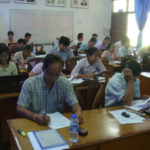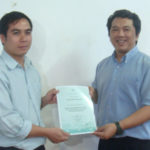

Improving Lao’s livestock and fisheries research through better statistical skills
March 20, 2014

Livestock systems research is receiving increased attention in countries in the Mekong Group, with increasing prices for livestock products associated with increased livestock consumption, particularly in Vietnam, China and Thailand. Improved livestock production is increasingly becoming recognised as a way to improve incomes in both the upland and lowland agricultural areas of Laos, and there is increased attention of donor agencies, including Australia’s ACIAR, in providing support for more livestock production focused research. An important component of the needed capacity development is the enhancement of related statistics/biometrics skills of local research staff.
The Crawford Fund training course, “Experimental Design, Data Analysis and Interpretation for Livestock and Fisheries Research” was supported by the NSW committee and provided training for Lao PDR researchers working in the areas of livestock and fisheries research to help fill this need.
While initially planned for 15 participants, such was the interest that a total of 28 participants were involved in the course which was provided by Associate Professor Monchai Duangjinda and Dr Wuttigrai Boonkum, both from the Department of Animal Science, Faculty of Agriculture, Khon Kaen University, Khon Kaen, Thailand; and Mr Viengsavanh Phimphachanhvongsod, National Livestock Research Center, Lao National Agriculture and Forestry Research Institute, Ministry of Agriculture and Forestry, Vientiane, Lao PDR.

Training activities included:
- The importance of animal science research
- Steps in the planning good experiments
- Exploratory data analysis
- t-test and basic experimental designs
- Relationships analyses
- Basic non parametric analyses
- Common errors in statistical analyses and experiments.
Dr John Schiller, who helped organise the training, reported that feedback from participants was that they found it very useful and are hoping that consideration might be able to be given for the support of further courses.
He noted that the use of the Thai language for the conduct of the course was also regarded as being beneficial, particularly for participants from provincial locations, where they have limited opportunity for improving their English language skills.




